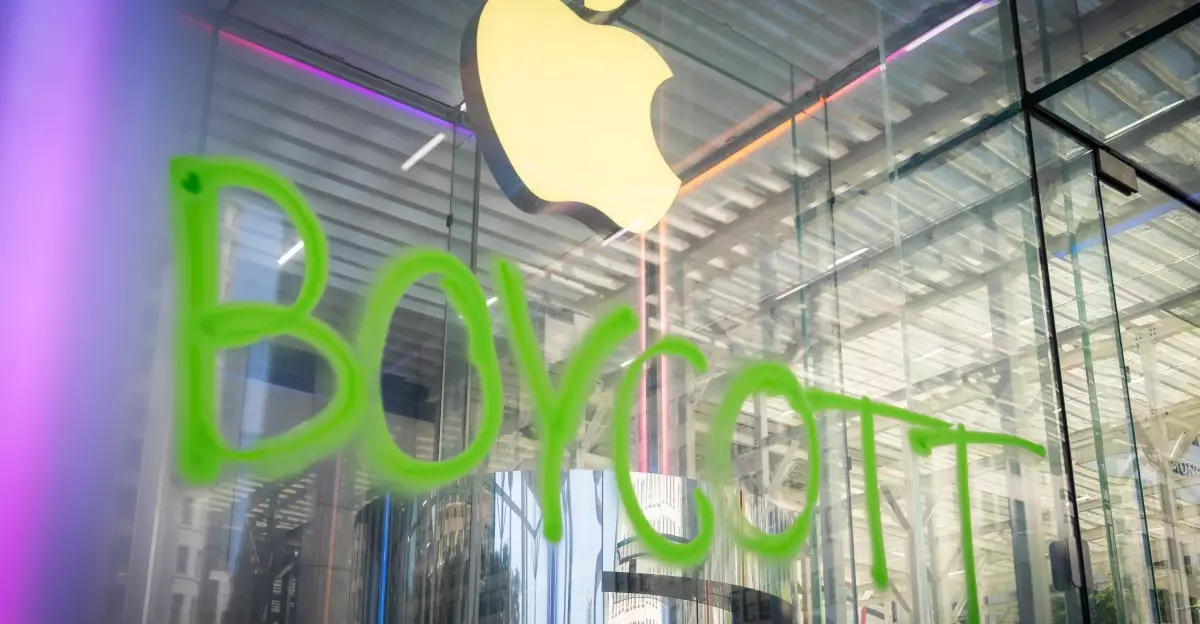In a courageous display of activism, members of Extinction Rebellion (XR) boldly confronted the lack of genuine climate commitment fromMajor technology corporations. The protest, staged at Apple’s prominent Fifth Avenue store in New York City, underscores a troubling paradox: on one hand, these companies publicly tout their sustainability initiatives, yet behind the scenes, they coddle political regimes that threaten global environmental progress. This clash between image and reality exposes a deeper issue—how corporate interests often eclipse genuine climate action, betraying public trust and Environmental commitments.
The act of spray-painting provocative slogans such as “Boycott” and “Tim + Trump = Toxic” signifies a stark critique aimed directly at Apple’s leadership. By targeting Tim Cook, the protestors spotlight one of the most powerful figures in tech who, despite prior claims supporting the Paris Agreement, appears to have shifted stance, aligning more with political entities hostile to environmental protections. The symbolism of these actions is unavoidable—publicly shaming a company that brands itself as environmentally conscious for its continued ties to political figures and policies that undermine climate goals. XR’s intervention isn’t just about a storefront; it’s about cracking open the façade of greenwashing and forcing consumers to question the sincerity of corporate climate narratives.
The Political Alliance of Big Tech and Conservative Policies
The protest is rooted in a glaring political paradox: some of the world’s largest tech CEOs—Apple’s Tim Cook, Google’s Sundar Pichai, Zuckerberg of Meta—have publicly claimed to champion environmental causes. However, their political alliances tell a different story. The protest highlights their support—either directly or indirectly—for the Trump administration, which was notorious for dismissing climate science and rolling back environmental regulations. By aligning themselves with such a regime, these CEOs seem to prioritize economic interests and political convenience over authentic climate advocacy.
This hypocrisy exposes a broader pattern of corporate doublespeak where environmental pledges are used mainly as marketing tools, rather than commitments backed by action. When top executives appear at political events that oppose climate policy, it signals a troubling prioritization of political alliances over planetary health. The protest makes it painfully clear that these leaders are betraying their own proclaimed values—supporting policies that accelerate climate change rather than combat it. It’s an approach that raises questions about whether these companies are merely performing environmental activism for brand image rather than taking substantial steps to reduce their ecological footprint.
The Stark Reality of Tech’s Energy Appetite and Environmental Impact
Beyond political hypocrisy, the protest underscores an uncomfortable truth: the growth of the tech industry itself is a significant driver of environmental degradation. As artificial intelligence, data centers, and cloud services expand, so does energy consumption. Google’s recent sustainability report revealed an 11% increase in carbon emissions last year, demonstrating that even industry leaders claiming to be eco-friendly are contributing to the problem. Microsoft’s AI investments, estimated to consume more electricity than entire sectors like Bitcoin mining, illustrate that technological progress often comes with a steep environmental price tag.
The protest challenges corporations to scrutinize their claims of sustainability vis-à-vis their actual energy use. If tech giants are so committed to combating climate change, why do their operations accelerate emissions? The inconsistency is glaring. The narrative of green innovation is undermined by the reality of relentless energy demands, which threaten to undo the progress made through token initiatives. As XR points out, true climate leadership requires more than superficial sustainability reports; it necessitates a fundamental reevaluation of the energy models underpinning tech infrastructure.
The Cultural and Ethical Implications of Corporate Climate Duplicity
This protest also reveals the evolving role of activism in holding corporations accountable. It highlights the importance of transparency, ethics, and integrity in the fight against climate change. Consumers and activists alike are increasingly scrutinizing corporate promises versus tangible actions, demanding accountability for environmental impact. The visceral act of painting messages on a storefront is, in essence, a call for greater moral responsibility—a challenge to corporations to live their values rather than just advertise them.
Moreover, the protest exemplifies a broader cultural shift: activism is no longer confined to traditional protests but incorporates direct action that disrupts corporate spaces. The symbolism of defacing an iconic retail store serves as a wake-up call, pushing companies to reflect on whether their environmental commitments are genuine or merely performative. For the tech industry, which wields enormous influence over global communication and technological development, the stakes could not be higher. Their actions—or inactions—will shape the planet’s future trajectory, making their moral and environmental accountability paramount.
The unfolding spectacle at Apple’s NYC storefront acts as a potent reminder: environmental advocacy must be rooted in unequivocal action. It exposes the disparities between corporate rhetoric and reality while challenging the industry’s long-standing hypocrisy. If these companies truly aim to be leaders in sustainability, now is the moment for meaningful change—not just symbolic gestures or political alliances that serve their interests. The climate crisis demands more than staged apologies; it calls for unwavering integrity and a courageous reevaluation of priorities—before it’s too late.

